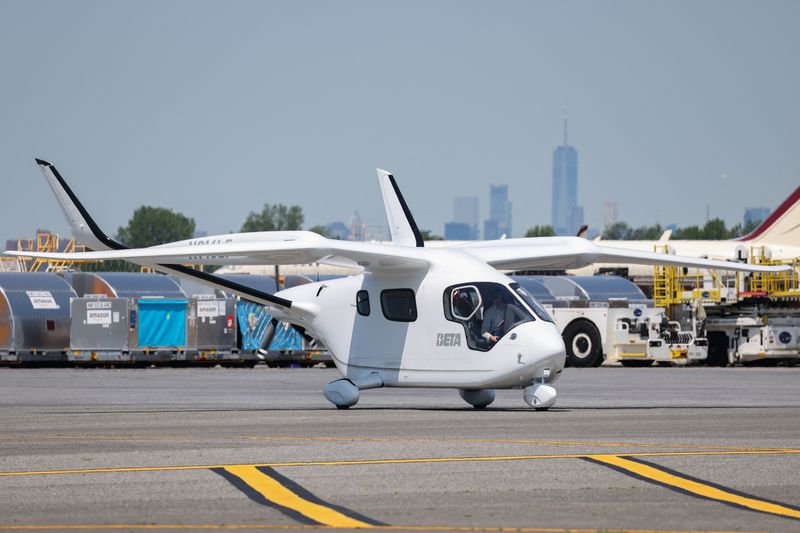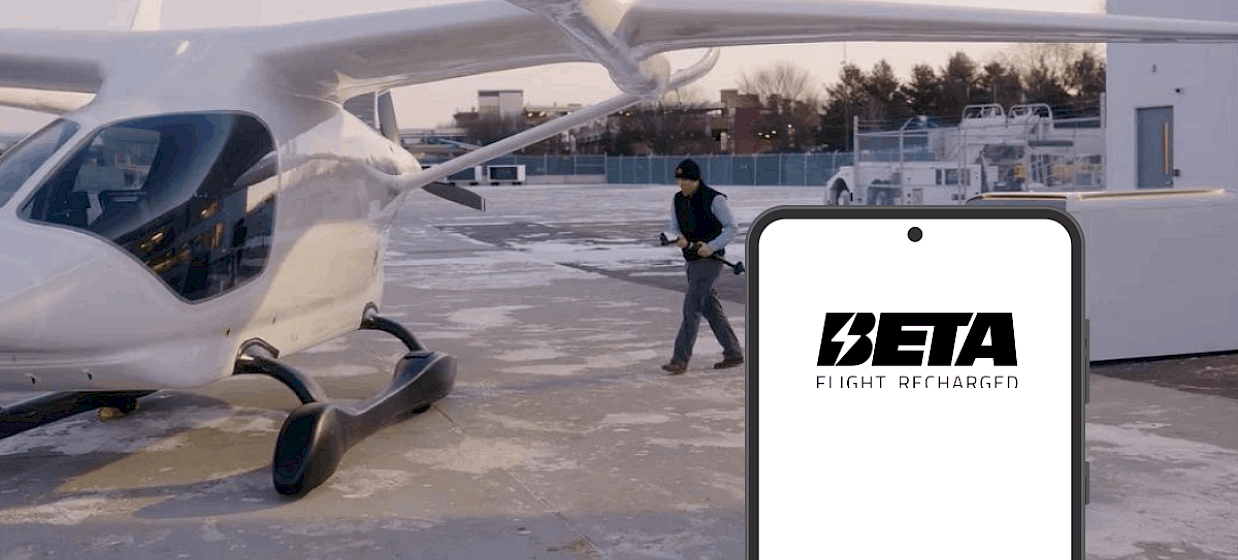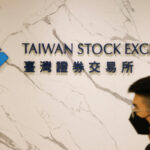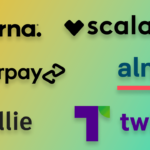Now Reading: Is Beta Technologies Stock the Future of Aviation Investing?
-
01
Is Beta Technologies Stock the Future of Aviation Investing?
Is Beta Technologies Stock the Future of Aviation Investing?

The world of transportation is changing fast, with electric vehicles leading the charge on the ground. But what about the skies? Companies are racing to develop electric aircraft, and one name that consistently comes up is Beta Technologies. As interest in sustainable aviation grows, many are asking about Beta Technologies stock. This company is a key player in the electric vertical takeoff and landing (eVTOL) space, creating innovative aircraft designed for everything from cargo delivery to passenger transport.
For investors looking for the next big thing, the idea of owning a piece of a company like Beta is exciting. However, there’s a catch: Beta Technologies is currently a private company. This means you can’t just open your brokerage account and buy shares of Beta Technologies stock on the New York Stock Exchange or Nasdaq. But don’t let that stop your curiosity. Understanding Beta Technologies, its mission, its financial backing, and the broader eVTOL market is crucial for anyone interested in the future of aviation and potential investment opportunities down the road. This guide will walk you through everything you need to know.
Key Takeaways
- Private Company: Beta Technologies is not publicly traded, so Beta Technologies stock is not available on public stock exchanges.
- eVTOL Innovator: The company is a leader in developing all-electric aircraft, specifically the ALIA-250, for cargo and passenger use.
- Strong Financial Backing: Beta has secured significant funding from major investors like Amazon’s Climate Pledge Fund, Fidelity, and TPG Rise Climate.
- Path to Public Offering: While not public yet, a future Initial Public Offering (IPO) is a possibility as the company matures and its aircraft achieve certification.
- Market Potential: The eVTOL market is projected to grow significantly, offering potential long-term opportunities for early industry players.
What is Beta Technologies?
Beta Technologies is an American aerospace manufacturer headquartered in South Burlington, Vermont. Founded in 2017 by Kyle Clark, the company is dedicated to developing and producing electric aircraft. Their primary focus is on creating safe, reliable, and sustainable aviation solutions to transform how we move goods and people. Unlike traditional airplane manufacturers, Beta is building its technology from the ground up, centered around electric propulsion. This approach aims to reduce carbon emissions, lower noise pollution, and decrease operational costs compared to conventional aircraft.
The company’s mission goes beyond just building planes. They are creating an entire ecosystem to support electric flight. This includes designing their own proprietary charging systems that can power up an aircraft in under an hour. By developing both the vehicle and the infrastructure, Beta is positioning itself as an end-to-end solution provider in the emerging Advanced Air Mobility (AAM) market. Their work has attracted attention from commercial and military sectors, making the prospect of a future Beta Technologies stock offering a hot topic among forward-thinking investors.
The Visionary Behind Beta: Kyle Clark
Every innovative company has a driving force, and for Beta Technologies, that person is Kyle Clark. An engineer and professional pilot, Clark brought a unique blend of hands-on experience and technical expertise to the company. Before founding Beta, he was involved in various engineering projects and even started a company that designed and built electric vehicle components. His passion for aviation and sustainability converged to create Beta’s vision. Clark’s leadership style is known for being grounded and practical, focusing on building a simple, efficient, and certifiable aircraft rather than a futuristic concept that may never leave the drawing board. This pragmatic approach has been a key factor in the company’s progress and has helped build trust with investors and partners.
Beta’s Flagship Aircraft: The ALIA-250
At the heart of Beta’s operations is its signature aircraft, the ALIA-250. This isn’t just one plane; it comes in two main versions designed for different purposes: a cargo carrier and a passenger vehicle. Inspired by the flight of the Arctic tern, a bird known for its incredible long-distance migrations, the ALIA-250 is designed for efficiency and endurance. It features a unique combination of a fixed wing for cruising and rotors for vertical takeoff and landing. This hybrid design allows it to operate without a traditional runway, opening up possibilities for new routes and services from urban centers to remote locations.
The cargo version, ALIA-250c, is built to carry approximately 1,400 pounds of goods in a 200 cubic foot space. This has attracted major logistics companies looking for faster and greener ways to move packages. The passenger model, the ALIA-250, is configured to carry up to five passengers plus a pilot. Both versions share the same airframe and propulsion system, which simplifies manufacturing and maintenance. As these aircraft move closer to FAA certification, the excitement around a potential Beta Technologies stock continues to build, as commercial viability becomes a tangible reality.
The Technology Powering ALIA
What makes the ALIA-250 so special is the technology under the hood. The aircraft is 100% electric, powered by a distributed direct-drive electric propulsion system. This means it has multiple electric motors and propellers, which provides redundancy and enhances safety—if one motor fails, the others can continue to operate. The design prioritizes simplicity and reliability to meet the rigorous standards of the Federal Aviation Administration (FAA). Beta is also developing its own battery packs, which are crucial for achieving the necessary range and performance. By controlling this key component, Beta can optimize the entire system for its aircraft, a strategic advantage in the competitive eVTOL landscape.
Why Can’t I Buy Beta Technologies Stock?

The most common question from interested investors is, “How can I buy Beta Technologies stock?” The simple answer is: you can’t, at least not in the traditional sense. Beta Technologies is a privately held company. This means its shares are not listed on public stock exchanges like the Nasdaq or the New York Stock Exchange (NYSE). Instead of being owned by the public, ownership is limited to a smaller group of founders, employees, and private investors.
Companies often choose to stay private in their early growth stages for several reasons:
- Flexibility: Private companies don’t have to answer to a wide base of public shareholders, giving them more freedom to focus on long-term research and development without the pressure of quarterly earnings reports.
- Control: Founders and early investors can maintain more control over the company’s direction and decisions.
- Confidentiality: They are not required to disclose financial information and business strategies to the public, keeping their plans away from competitors.
While you can’t buy Beta Technologies stock today, the situation could change in the future through an Initial Public Offering (IPO).
The Path to an IPO
An IPO is the process through which a private company becomes a public one by offering its shares to the general public for the first time. For a company like Beta Technologies, going public would be a major milestone. It would allow them to raise a significant amount of capital to scale up manufacturing, expand their operations, and fund ongoing innovation. It would also provide a way for early investors and employees to cash in on their equity.
However, companies typically only consider an IPO when they have a mature business model, a clear path to profitability, and have met key regulatory milestones. For Beta, a critical step is achieving FAA type certification for its ALIA aircraft. This certification is a rigorous and lengthy process that proves the aircraft is safe to operate for commercial purposes. Once certification is secured and commercial operations begin, the likelihood of an IPO for Beta Technologies stock will increase substantially.
Who Are the Major Investors in Beta Technologies?
Even though Beta Technologies stock isn’t publicly available, the company isn’t short on cash. It has successfully raised hundreds of millions of dollars through several rounds of private funding. The list of investors is impressive and includes some of the biggest names in finance and industry. This strong backing is a major vote of confidence in Beta’s technology and business plan.
|
Investor Group |
Notable Names |
Strategic Importance |
|---|---|---|
|
Venture Capital |
Fidelity Management & Research, TPG Rise Climate |
Provides significant growth capital and financial expertise. |
|
Corporate & Strategic |
Amazon’s Climate Pledge Fund, United Therapeutics |
Validates the technology and provides a direct path to market with key customers. |
|
Private Equity |
Blackstone, Redbird Capital |
Offers long-term financial support and operational guidance for scaling the business. |
Amazon’s Climate Pledge Fund
One of Beta’s most significant investors is Amazon’s Climate Pledge Fund. Amazon has pre-ordered Beta’s electric cargo aircraft to support its goal of creating a zero-carbon logistics network. This partnership is more than just financial; it provides Beta with a massive, built-in customer for its cargo planes once they are certified and operational.
United Therapeutics
Another key partner is United Therapeutics, a biotechnology company focused on organ manufacturing. They plan to use Beta’s aircraft to create a rapid, zero-carbon transportation system for life-saving organs. This unique use case highlights the versatility and potential social impact of eVTOL technology.
The Competitive Landscape of eVTOL Aircraft
Beta Technologies is a major contender in the Advanced Air Mobility (AAM) space, but it’s not alone. The race to build the first commercially successful electric aircraft is crowded and competitive. Several other well-funded companies are also developing their own eVTOLs, and some of them are already publicly traded. Understanding the competition provides context for Beta’s position in the market.
Some of Beta’s main competitors include:
- Joby Aviation (JOBY): A leading eVTOL company that is also in the late stages of FAA certification. Joby went public via a SPAC merger and is a key rival.
- Archer Aviation (ACHR): Another major player that is publicly traded. Archer has partnerships with United Airlines and is focused on developing an urban air taxi network.
- Vertical Aerospace (EVTL): A UK-based company with a different design philosophy, partnering with major airlines like American Airlines and Virgin Atlantic.
- Wisk Aero: A subsidiary of Boeing, giving it immense resources and aerospace experience.
While these competitors are formidable, Beta’s pragmatic design, focus on a dual cargo/passenger market, and development of its own charging infrastructure give it unique advantages. As a financial resource, Forbes Planet often covers developments in this innovative sector, offering insights into market dynamics.
How to Invest in the eVTOL Market Today
Since you can’t directly invest in Beta Technologies stock, you might be wondering how you can gain exposure to the exciting eVTOL industry. The good news is there are several ways to invest in the broader trend of electric aviation.
Investing in Publicly Traded eVTOL Companies
The most direct way is to purchase shares of Beta’s competitors that have already gone public. Companies like Joby Aviation (JOBY) and Archer Aviation (ACHR) are listed on U.S. stock exchanges. Investing in these companies allows you to participate in the AAM market’s growth. However, remember that these are still early-stage companies, and their stocks can be volatile.
Investing in Suppliers and Partners
Another strategy is to invest in the companies that supply the eVTOL industry. This could include battery manufacturers, composite materials producers, software developers, or avionics companies. This approach is less direct but can be a lower-risk way to benefit from the industry’s growth without betting on a single aircraft manufacturer.
Investing in Aerospace and Defense ETFs
For a more diversified approach, you could consider an exchange-traded fund (ETF) that focuses on the aerospace and defense sector. While these ETFs won’t be purely focused on eVTOLs, many of the large, established companies within them (like Boeing and Textron) are investing in or developing their own AAM technologies.
The Future Outlook for Beta Technologies
The future for Beta Technologies looks bright but is also filled with challenges. The company’s primary goal is to achieve FAA type certification for the ALIA-250. This is the single most important milestone and will unlock the door to commercial operations. Beta has been making steady progress, flying its prototypes extensively and working closely with regulators.
Once certified, the company will need to scale its manufacturing capabilities to fulfill its impressive order book from customers like Amazon, UPS, and the U.S. Air Force. Building aircraft at scale is a complex and capital-intensive process. This need for capital is a strong argument for a future IPO, which would provide the necessary funds for expansion. As the world moves toward more sustainable solutions, the demand for electric aviation is only expected to grow, placing Beta in a strong position for long-term success.
Conclusion
The buzz around Beta Technologies stock is a clear indicator of the growing excitement for the future of aviation. While you can’t purchase shares today, Beta Technologies represents a powerful force in the transition to electric flight. With a practical and efficient aircraft, a robust charging infrastructure, and backing from some of the world’s biggest companies, Beta is well-positioned to become a leader in the AAM market. For now, investors should keep a close watch on the company’s progress toward FAA certification and the broader eVTOL industry. When the day comes that Beta Technologies stock is offered to the public, those who have done their homework will be ready to make an informed decision.
Frequently Asked Questions (FAQ)
Q1: Is Beta Technologies publicly traded?
No, Beta Technologies is a private company. Its stock is not available for purchase on public stock exchanges like the NYSE or Nasdaq.
Q2: How can I invest in Beta Technologies?
Currently, direct investment is limited to accredited investors participating in private funding rounds. For the general public, there is no way to buy Beta Technologies stock until the company decides to go public through an IPO.
Q3: Who are the main competitors of Beta Technologies?
Beta’s main competitors in the eVTOL space include publicly traded companies like Joby Aviation (JOBY) and Archer Aviation (ACHR), as well as Wisk Aero (a subsidiary of Boeing) and Vertical Aerospace (EVTL).
Q4: What is an eVTOL?
eVTOL stands for electric Vertical Takeoff and Landing. It is a type of aircraft that uses electric power to take off, hover, and land vertically, like a helicopter, but can also fly like a conventional airplane.
Q5: What is the primary aircraft Beta Technologies is developing?
Beta’s flagship aircraft is the ALIA-250. It is being developed in two versions: one for cargo and one for passenger transport.
Q6: When will Beta Technologies have its IPO?
There is no official timeline for a Beta Technologies stock IPO. A public offering would likely only be considered after the company achieves FAA type certification for its ALIA aircraft and begins commercial operations.
















